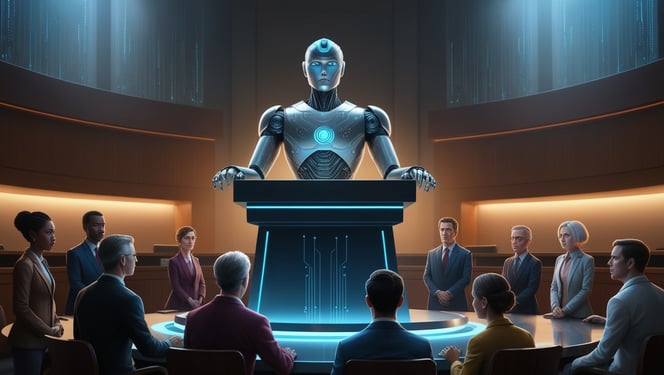AI as the New Judge: Can Machines Deliver True Justice?
The prospect of AI judges sparks debates about justice, bias, and morality. Could machines eliminate human flaws in the legal system, or would they create new ones? This blog explores the promise, risks, and ethical dilemmas of AI in the courtroom, questioning whether true justice can ever be automated.
Adheesh Soni
12/5/20242 min read


AI as the New Judge: Can Machines Deliver True Justice?
Introduction: A Future Courtroom Without Humans?
Imagine walking into a courtroom where the judge isn’t a person but an AI—a machine programmed to evaluate evidence, apply laws, and deliver verdicts. Sounds efficient, doesn’t it? But is it truly just? This thought hit me during a debate competition when someone argued that AI could eliminate human biases in law. While it sounds revolutionary, it also feels unsettling.
Could a machine, devoid of emotions and human experiences, ever understand the nuances of justice? Let’s delve into the promise and perils of AI stepping into the role of judges and juries.
1. The Case for AI in Justice
a. Efficiency and Speed
One undeniable advantage of AI is its ability to process vast amounts of data quickly.
Case Backlogs: Courts worldwide face staggering delays. AI could expedite decisions, clearing these backlogs.
Standardized Judgments: Machines follow programmed logic, reducing discrepancies in rulings for similar cases.
b. Elimination of Bias
Humans are inherently biased—whether due to cultural, personal, or unconscious factors. AI offers the potential to neutralize these biases.
Objective Analysis: AI doesn’t favor gender, race, or socio-economic status.
Evidence-Based Decisions: Machines rely solely on facts and legal precedents, not emotions or external pressures.
In theory, AI judges could revolutionize the justice system, making it faster, fairer, and more consistent.
2. The Risks and Challenges
a. Can AI Understand Morality?
Justice isn’t just about applying laws—it’s about interpreting them with empathy.
Context Matters: A machine can’t fully grasp the complexities of human behavior or cultural sensitivities.
Moral Gray Areas: Laws are often open to interpretation. Can AI make nuanced decisions in cases like euthanasia or freedom of speech?
b. The Problem of Algorithmic Bias
Ironically, while AI is seen as unbiased, it can inherit the biases of its creators or training data.
Discrimination Risks: If an AI system is trained on flawed data, it could perpetuate systemic biases.
Opaque Decision-Making: AI often functions as a "black box," making it difficult to understand how decisions are made.
In my opinion, placing blind trust in AI for justice could create new kinds of inequality instead of solving existing ones.
3. Ethical and Legal Implications
a. Accountability: Who’s Responsible?
If an AI judge delivers an unfair verdict, who is to blame?
The Developer: Should programmers be held accountable for biases in AI?
The User: What about the courts that rely on AI systems?
This question of accountability is a significant hurdle for adopting AI in legal systems.
b. Privacy Concerns
To function, AI judges would require access to massive amounts of personal data.
Data Security: How can sensitive information be protected?
Consent: Should individuals have the right to refuse AI adjudication in favor of a human judge?
4. A Hybrid Model: The Best of Both Worlds?
a. Augmenting, Not Replacing
Instead of replacing human judges, AI could serve as a tool to assist them.
Case Research: AI could analyze precedents and summarize evidence, saving time.
Bias Detection: Machines could flag potential inconsistencies or biases in human rulings.
b. Ensuring Oversight
Combining AI efficiency with human oversight might strike the right balance.
Transparency: Make AI algorithms open to scrutiny.
Human Override: Ensure humans have the final say in critical cases.
Conclusion: Justice in the Age of Machines
The idea of AI as a judge is both thrilling and terrifying. It promises speed and impartiality but risks dehumanizing the justice system. In my view, while AI can play a valuable role in enhancing judicial processes, the heart of justice will always require human empathy, understanding, and morality.
